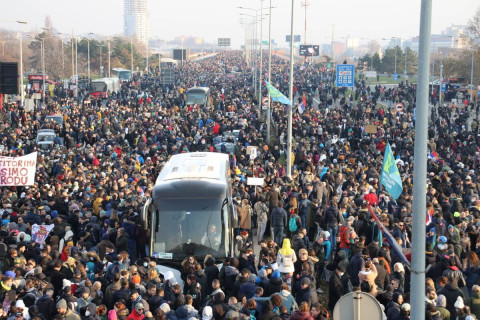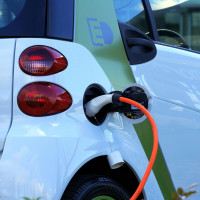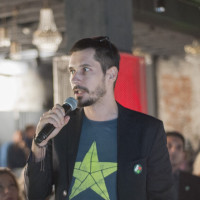Hounding Citizens How the “Eco-Terrorism” label fuels Green Colonialism in Serbia and worldwide
Topics
We have seen environmental activists arrested in Australia, England and Germany. New laws may mean we will see it soon in Italy and the Netherlands as well. Right now, Serbia’s government has jumped on the bandwagon, ironically repressing environmental activists in the name of defending a ‘green transition’. In the aftermath of 1st September protests in Belgrade, Serbian President Aleksandar Vučić’s regime has taken to labelling anyone with an interest in protecting rivers and habitats from foreign interests and mining corporations as “eco-terrorists”. In many ways, this is an inevitable consequence of Vučić’s embrace of neo-colonial economic policies, but it important to take full note of what is really going on.

Photo: Mašina
Originating from the Latin “terrēre“, the word terror implies an act of intimidation or causing fear. Serbia’s criminal law emphasises terrorism’s goal of imposing a sense of insecurity or fear on citizens. But judging by recent history, a terrorist can also be a person who administers a Facebook page (as was the case with Zorana Crnojević), uses scientific arguments (the author of this text), disrupts public traffic (Ivan Bjelić), or simply finds themselves in the wrong place at the wrong time. For example, innocent citizens saw their homes raided by police officers and hooligans, incidents that were compounded by pro-regime media and pro-mining websites. Recent events have opened the Pandora’s box of state coercion, and the latent possibility for every citizen to be branded an eco-terrorist.
Though Vučić’ bears much of the responsibility, he does not act alone. According to the mining giant Rio Tinto, public anger at mining projects such as its proposed lithium mine in the Jadar valley of western Serbia, results from a “methodically planned and coordinated campaign aimed at spreading disinformation”. In other words, they view themselves as victims not aggressors. From there it is a small leap to the Serbian government’s cries of eco-terrorism, police raids on private homes looking for supposed coordinators of this disinformation campaign, no matter whether they are students or pregnant women (as was the case with Zorana Crnojević, mentioned above). The convergence between state and corporate explanations of events are not a coincidence.
Vučić’s party creates tensions among its own citizens by bringing new corporations to the country and giving them virtually limitless powers. It escalates the eco-terrorist rhetoric while turning a blind eye to possible safety threats to its citizens, thus putting foreign interests and its own subservience to foreign capital before anything else. It is difficult to proclaim the entire nation eco-terrorists, so the ultimate goal is to divide opposition into separate groups. By stigmatising its own people in this selective manner, Vučić’s regime speaks in the language of colonialism. All this is the price we pay for mines, or any other investment associated with the ruling government – the regime.
However, the worst is yet to come. The relationship between the government and foreign corporations will continue to cause friction among citizens. This is the only logical outcome considering the government’s existing contractual commitments to foreign corporations. Despite Rio Tinto’s claims of a coordinated campaign, our movement long ago outgrew the capacity of any single individual to coordinate it. The fact that the number of environmental movements has grown significantly during Vučić’s regime is no coincidence and he knows it. The revolt is authentic, and a direct response to the growing number of multinational corporations moving production to Vučić’s Serbia. They merely follow the path Vučić laid out for other large corporations: Zijin Copper, that caused the environmental movements in the mining town of Bor; HeSteel that prompted citizen mobilisation in Smederevo; China Road and Bridge Corporation that caused protests in Šodroš and Dunavac (Novi Sad); and Rio Tinto that was resisted in Gornje Nedeljice, Radjevina, Dobrinja, and the entire municipality of Loznica.
Citizen uprisings are a reaction to the inflow of large capital. They are an expression of a natural desire to protect people and the environment. Their safety and wellbeing are now threatened by Vučić’s regime, whose courting of foreign corporations now depends on political repression. But even if the state arrests every person it labelled an eco-terrorist, they will not stop future protests.
The roots of this situation spread far beyond Serbia. Much of the capital which the regime utilizes for its own purposes originates in China and the European Union. Lithium has become essential for the German automobile industry as it transitions toward electric cars. Rio Tinto thus plays an important role for Germany. At the same time, the Chinese automobile and steel industries are coming to the country with Vučić’s help, including Linglong Tire and HeSteel. Many foreign companies that have been present in Serbia for years, are expanding. There is a growing sense that the state has no control over them – or rather has given up on trying to exert influence – and even courts them on this journey, that is, the supposed ‘green transition’.
Vučić’s tendency to give in to the international capital has already posed specific problems for Serbia: the uncontrolled import of Vietnamese workers, unauthorised factory building, construction permits issued without environmental sustainability studies, or allowing the corporations themselves to do those studies (as is the case with Rio Tinto). Even when corporations are found to have damaged the environment, courts (like the one in Zaječar) impose fines lower than what is prescribed by the law. As citizens grow familiar with this exploitation, it’s no wonder that we have so many environmental movements.
Rio Tinto’s theory that this is a “methodically planned and coordinated campaign” is a lie. No such campaign exists. Rather, citizens in different municipalities are independently rebelling against Serbia’s economic policies. If any of the 60 people arrested in the wake of September protests is an actual coordinator, then the entire country is. Claims like these, and indeed the eco-terrorism label, hope to hide that Serbia is becoming a mining colony before our eyes. They also use it to conceal their actual goal – maintaining the rule of Vučić and his party. As a concept, the green transition is at risk from its association with Vučić’s authoritarianism. Vučić, by allowing his subordinates to use violence, recalls so many colonial leaders of the past. Ecological terrorism is not a new term and was previously used as an instrument of repression in Africa and elsewhere. As ever, allegations like this reveal more about the accuser than the accused.
Recently, members of the English movement ‘Just Stop Oil’ were sentenced to four and five years in prison. Their crime? Planning a peaceful protest over a Zoom call. The Netherlands recently considered passing a law that would make any protest where people wear masks illegal, while a similar law in Italy aims to criminalise protests altogether. Human Rights Watch reports that over the past few years multiple countries have restricted the freedom to organise protests. In the meantime, environmental activists are increasingly targets of arbitrary arrests, mistreatment, and accusations they are terrorists. We now, unfortunately, must include Vučić’s Serbia in this list. And this should force us to re-think how the green transition is implemented, and the dangers of its increasing reliance on colonial practices (new and old). By internationalising the lithium issue and connecting the people of Serbia with others who resist, we can counter the broader implications of global trends to limit citizens’ rights to protest, because this is part of an international tendency.
In Serbia, it is no longer clear how far Vučić is willing to go, and there is reason for alarm. The more foreign corporations that enter Serbia, the more citizens will oppose threats to their homes and environment. Now it is clear they are also tasked with fighting a regime that criminalises its own people. We are all eco-terrorists now.


